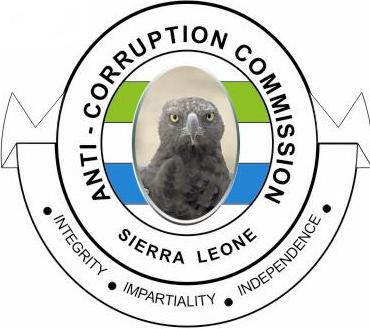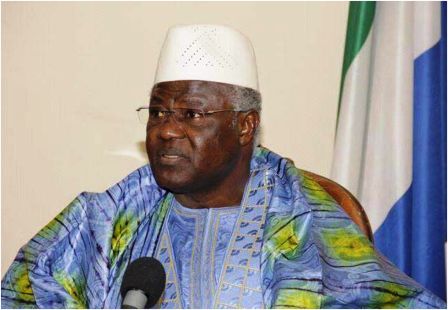ACC sensitizes Jawei, Kissy Teng and Kissy Kama chiefdoms in Kailahun district
The Eastern Regional office of the Anti-Corruption Commission has concluded public education and sensitization meetings in the Jawei, Kessi Teng and Kissy Kama Chiefdoms in the Kailahun District. The meetings were held in the Court Barries of Daru, Kangama and Dia, the chiefdom headquarter towns on the 11th, 12th and 13thSeptember, 2012 respectively. (Photo: Chiefdom authorities of Jawei chiefdom)
Explaining the purpose of such engagements, District Coordinating Officer Kenema, Mohamed Sylvanus Blake who deputized Sam P. Gogra of Kailahun said that the ACC was in the various chiefdoms not because the chiefdom authorities were corrupt or because of rampant corruption in these chiefdoms, but that they were there in fulfillment of the Commission’s mandate of educating the public about the bad effects of corruption, the benefits of a corrupt free nation and to ask for public support in the fight against corruption. He said that people may have heard about the Commission through radio broadcasts or jingles but that the Commission deemed it most appropriate for the chiefdom people to have a face to face interaction with staff of the Commission in order to have a better understanding of the Commission and its operations. Mohamed Blake gave the background of the Commission tracing its establishment to the recommendations of the Truth and Reconciliation Commission (TRC) which established the causes of the decade long civil war in this country. Corruption and bad governance were among the many factors that the TRC found out that caused the war and in 2000. Government, in adherence to the TRC recommendations established the Anti-Corruption Commission through an Act of Parliament with the mandate to lead the fight against corruption through education, prevention and confrontation.
Mr. Blake underscored the fact that as a Commission, they need the support of the people if they are to succeed in the fight against corruption, which is why the ACC was in their chiefdoms as part of the recruitment drive to increase the membership of the anti-corruption force. Mr. Blake implored the people to join forces with ACC to weed out the few corrupt people who are bent on impoverishing the majority of Sierra Leoneans.
Giving an overview of the Commission and its operations, the Public Education Officer Peter Baio Kamara explained that the Commission takes a three pronged approach to the fight against corruption; education, prevention and confrontation. He said that the Commission lays premium on public education, because education brings knowledge and knowledge empowers people. That is why the ACC is making it a point of duty to reach out to Sierra Leoneans in every community so that they are empowered enough to on take the corrupt minority in the Country.
He said, since corruption thrives in a system, the ACC also involves in what is referred to as a review of systems and processes in Ministries, Departments and Agencies (MDAs) to look at existing structures and or modes of operation that create room for corruption to thrive and makes recommendations on best practice. He emphasized that the Commission gives preference to public education and prevention of corruption. When these approaches are not heeded to, the last option becomes prosecution. He catalogued the achievements of the Commission ranging from public education engagements and systems reviews carried out in MDAs, recoveries made and the high profile prosecutions and convictions secured with the most recent being that of the former Mayor of the Freetown City Council Herbert George-Williams and others.
Addressing the chiefdom authorities and the people of the various chiefdoms, the Eastern Regional Manager of the Anti-Corruption Commission, Evelyn Samuella Walker, expressed thanks and appreciation to the chiefdom authorities on behalf of the Commissioner for the warm welcome accorded the ACC team. She said she was highly impressed with the large turnout of women whom she said suffer more from the effects of corruption.
The Regional Manager explained some of the corrupt practices and said that the 2000 Act had nine corrupt practices but that when the Act was amended 2008 the practices were increased to twenty seven. She highlighted several practices contained in the AC Act 2008 such as offering, soliciting and accepting advantage, corrupting a public officer, Abuse of Office, Abuse of position, Misappropriation of public funds /property, Misappropriation of donor funds /property and protection of public funds and public revenue.
She explained the Free Healthcare Initiative and warned against its abuse by both the healthcare providers and the public.
She said, it was important for people to understand these practices as they are the ones likely to be practice in these communities stressing that it is an offence to give bribes to public officers for doing the work they are paid for and for public officers to ask for and accept bribe. She noted that people should not create the environment for bribery to take place adding that this is what most public officers do. She said bike riders for example should make sure that they comply with traffic rules and regulations by registering their motorbikes, having their driver’s licenses and not overloading. She equally warned that police should charge offenders to court and not take bribes from them warning that the penalty for any one offence is a fine not less than thirty Million Leones or three years imprisonment or both.
On the issue of NGOs’ operations in the chiefdoms, the Manager said that NGOs source funds for and on behalf of community people and those projects undertaken by NGOs should alleviate the plight of the rural people but they end up undertaking projects without consulting the people the projects are meant for. The Manager said that her attention has been drawn to many uncompleted projects in the chiefdoms and has asked the District Coordinator to find out from the NGOs about these projects. She informed the gathering that the Commission is looking into the operations of NGOs in the country and will come out with its findings.
She also cautioned chiefs and chiefdom authorities to be transparent and accountable to the people by issuing correct receipts for money paid by their subjects, she stressed that it is wrong for authorities not to issue receipts when they receive revenue from people.
Evelyn Walker explained the reporting procedures, the informant and witness protection and the 10% reward schemes and encouraged her audience to break the culture of silence and report corruption. She however cautioned against making malicious and false reports.
She gave the ACC hotlines and encouraged the people to make use of this opportunity and report corruption issues to the ACC either directly to the Report Centre in Freetown or the Regional office in Kenema or through the District Coordinating Officer in Kailahun
Earlier the chiefs welcomed the ACC and registered their appreciation for the move the ACC took to sensitize them about the Commission and its operations. They stated that the ACC’s presence will provide them the opportunity to better understand the operations of the Commission through the face to face interaction with the ACC staff.
In their closing statements, the Chiefdom Speakers in three chiefdoms appreciated the ACC for the sensitization and called for more of such engagements in future and advised all to stay away from corruption.
However they reechoed the none payment of salaries to chiefs and local administrators by government for several months adding that it is a recipe for chiefdom administrators to engage in corruption and called on the ACC to help bring their plight to the attention of Government and pledged their undivided support and commitment to the fight against corruption.
By Peter Baio Kamara, Public Education Officer, ACC Kenema
Stay with Sierra Express Media, for your trusted place in news!
© 2012, https:. All rights reserved.









